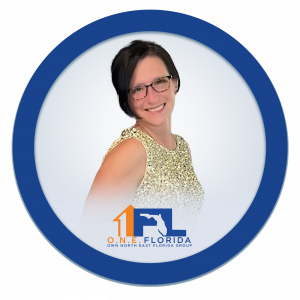Hey homeschool families!
Do you already homeschool and wonder if you can continue homeschooling when you move? Is Florida homeschool friendly? Have you heard Florida requires portfolio reviews, and then you panic because you will be coming from a state with minimal homeschool regulations? Instead, you will be coming from a state with so many requirements for homeschoolers that it makes you stressed not having the guidance? We moved our homeschool family from Illinois three years ago. I, too, was fearful of what the move would do to the homeschool way of life we were used to. Let me put your mind at ease right now—there is nothing to worry about; it is super easy to register and stay compliant. Let me give you information to help get you started on making sense of it all and hopefully make this part of your move easy peasy too!

How to register?
Search the county school district website you are moving to for homeschool registration. Most districts allow you to write up a letter of intent, also called LOI, and email it. Some have a form you can fill out and mail or an online registration format to submit. What ever way you choose or the district requires, you must register within 30 days of establishing your homeschool. You will receive an email certifying you are a registered homeschool, and it will include contact info for your district homeschool liaison. SAVE your email; this is essentially your license to homeschool.
How will you stay compliant?
You will have four options. Yearly portfolio reviews by a certified teacher; one of the more popular options. The cost is generally under $50 per student, and some reviewers will offer multi student discounts. Portfolios are due every year on the day your LOI was dated. You need to keep samples of their work from the, beginning, middle, and end of the school year for each class. I like to let my kids pick their favorites when compiling these samples. The point of the sampling is to show progress; that’s all. If using an online class, a grade report printed and or topics covered throughout will suffice. Keep a running list of field trips taken, books read, and other things they were involved in like, extra curricular and volunteering. There is a plethora of certified teachers that are also homeschoolers and can be found in any Florida homeschool social media groups you want to follow, or your school district can recommend one. You will either meet in person or meet in live video format. The teacher will talk to the students, ask questions, view assignments, and so on. Hence why I have my children pick their samples because this is a perfect way for them to enjoy their conversation and truly showcase that they have been active learners throughout the year. There is a form the certified teacher will fill out, and either you or the teacher will submit this form to the district.

Testing.
You can choose a nationally standardized test accepted by your district or take a state assessment test given at your local school at the time when other schools in the district are also testing. You will need to arrange these options with your district’s homeschool liaison.
Join an Umbrella school.
Umbrella schools typically take care of keeping you compliant with the school district. Their websites will explain what they track or what they report. Umbrella schools can be a great option if you want some oversight or guidance over your homeschool from outside sources. While enrolled in an umbrella school, you are usually considered a private school student. A homeschooler is, in a nutshell, a public school student. Generally this means they get similar benefits as public schoolers, like participating in district extracurriculars, free access to Florida Virtual School-Flex, free Dual Enrollment if qualified, and Florida’s Bright Futures Scholarship with requirements met. So, when choosing an umbrella school definitely ask if enrolling with them will change your homeschool status. As your child gets closer to their high school years this can be more important to know. For differing abilities you have other options; to have your child evaluated by a licensed or school psychologist or another valid measurement mutually agreed upon by both parent and school district. Contact your school district to discuss.

Homeschool meetup!
Where will you find other homeschoolers?
One of the two best options to find other homeschoolers is to join any Facebook groups in the district you are moving to or Florida state homeschool groups. Often they will have planned events to meet up, or you can search up co-ops and playgroups using those keywords in the search group function in the group. If you have a teenager, there are groups for them as well. The second option, and sometimes the most fun, to find fellow homeschoolers is during the public school day as you explore your area, parks, or visit the library—of course, if you are already a homeschool family, you know this trick!
In conclusion…
Homeschooling in Florida is easy to be compliant, and comes down to just two steps. First, contact the district you moved to and submit a letter of intent; second submit an annual portfolio review to your school district on the date of your letter of intent anniversary. Whenever in doubt always reach out to your school district for clarification. Policies and laws can change. Northeast Florida has a welcoming homeschool community; your family will enjoy exploring all Florida offers.
If you are moving to Northeast Florida below are the links to register for homeschooling.
Baker County
https://www.bakerk12.org/Page/
Clay County
https://choi.myoneclay.net/
Duval County
https://dcps.duvalschools.org/
Flagler County
https://www.flaglerschools.
Nassau County
https://www.nassau.k12.fl.us/
Putnam County
https://www.putnamschools.org/
St. Johns County
https://www.stjohns.k12.fl.us/



